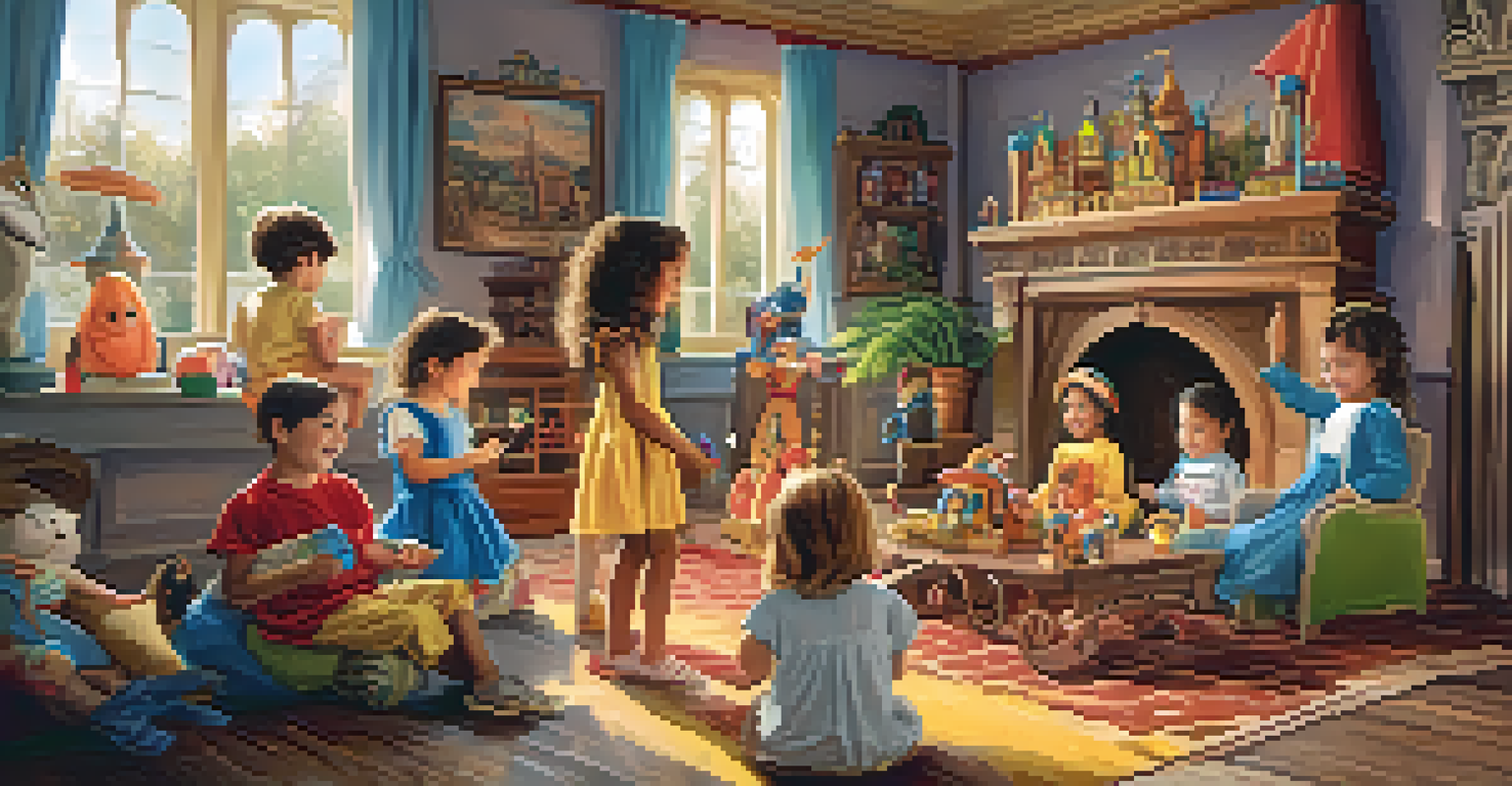Social Skills Development Through Interactive Play Activities

Understanding Social Skills and Their Importance
Social skills encompass the abilities we use to communicate and interact with others. They are vital for building relationships, resolving conflicts, and navigating social situations effectively. In today’s interconnected world, strong social skills can significantly impact personal and professional success.
Play is the highest form of research.
These skills include everything from verbal communication to non-verbal cues like body language. Developing these abilities early on can lay a solid foundation for children, enabling them to express their thoughts and emotions clearly. Furthermore, social skills contribute to emotional intelligence, which is increasingly recognized as a key component of overall well-being.
Without proper social skills, individuals may struggle with forming friendships, which can lead to feelings of isolation and anxiety. Engaging in interactive play activities offers a fun and effective way to cultivate these essential skills, helping children learn how to cooperate, share, and communicate with others.
The Role of Interactive Play in Skill Development
Interactive play refers to activities where children actively engage with peers, fostering cooperation and communication. This type of play can take many forms, from structured games to imaginative role-playing. Each of these scenarios provides unique opportunities for children to practice and refine their social skills.

For instance, games that require teamwork, like relay races or building a fort, encourage children to collaborate and share ideas. During these activities, they learn to listen to others, negotiate roles, and resolve conflicts. Such experiences are invaluable as they mirror real-life social situations, making the lessons learned more applicable outside of playtime.
Social Skills Boost Relationships
Developing social skills through interactive play is essential for building strong personal and professional relationships.
Moreover, interactive play nurtures empathy and understanding, as children learn to see things from others' perspectives. This fosters a sense of community and belonging, essential elements for healthy social interactions throughout life.
Types of Interactive Play Activities to Consider
There are numerous interactive play activities that can effectively enhance social skills. Group games like 'Simon Says' or 'Duck, Duck, Goose' promote listening and following directions while also encouraging turn-taking. These simple games can be incredibly effective for younger children, providing a foundation for more complex social interactions.
Social skills are the key to success in life.
Creative play activities, such as art projects or building with blocks, can also facilitate social skills. When children work together on a project, they must communicate, share resources, and collaborate to achieve a common goal. This not only helps them develop verbal skills but also teaches the importance of teamwork and compromise.
Don’t forget about role-playing scenarios! Activities like pretend play allow children to explore different social roles and situations. This imaginative exploration helps them practice empathy and understand the dynamics of various social interactions, ultimately boosting their confidence in real-life situations.
Benefits of Play in Emotional Regulation
Interactive play doesn't just enhance social skills; it also plays a crucial role in emotional regulation. Through play, children learn to express their feelings and understand the feelings of others. This awareness is key to developing empathy and emotional intelligence, which are essential for healthy relationships.
When children engage in play, they encounter various emotional challenges, such as losing a game or navigating disagreements. These experiences teach them how to manage frustration, disappointment, and joy. By learning to cope with these emotions during play, children can carry these skills into their daily lives.
Play Enhances Emotional Regulation
Engaging in interactive play helps children learn to express and manage their emotions, fostering empathy and resilience.
Moreover, play offers a safe space for children to experiment with different emotional responses. They can try out new ways of expressing their feelings and observe how their peers react. This exploration is vital for developing resilience and adaptability in social situations.
Incorporating Play in Everyday Life
Incorporating interactive play into everyday life doesn't have to be complicated. Simple activities like family game nights or outdoor playdates can create opportunities for children to practice their social skills. The key is to ensure that these activities are engaging and promote interaction among participants.
Parents and caregivers can facilitate play by providing a variety of games and activities that encourage teamwork and communication. For example, organizing a scavenger hunt can promote collaboration as children work together to solve clues. This not only makes the activity fun but also reinforces their social skills in a natural setting.
Additionally, encouraging children to participate in group activities, such as sports or clubs, can further enhance their social skills. These environments provide them with ample opportunities to meet new friends, learn to work as part of a team, and practice effective communication.
Challenges in Developing Social Skills Through Play
While play is a powerful tool for developing social skills, there can be challenges along the way. Some children may feel shy or anxious in social situations, making it difficult for them to engage in play. These feelings can hinder their ability to practice and refine their social skills, creating a cycle of avoidance.
Another challenge is the prevalence of digital play, which can limit face-to-face interactions. While video games and online activities can be enjoyable, they often lack the social engagement that traditional play offers. To counteract this, parents should strive to create a balance between digital and interactive play, encouraging more opportunities for in-person interactions.
Long-Term Benefits of Social Skills
Strong social skills acquired during childhood can lead to greater academic success and improved life experiences.
Recognizing these challenges is the first step toward overcoming them. By providing support and encouragement, caregivers can help children build the confidence they need to engage in interactive play, ultimately enhancing their social skills over time.
The Long-Term Impact of Social Skills Development
The benefits of developing strong social skills through interactive play extend far beyond childhood. Individuals who possess good social skills are often more successful in both their personal and professional lives. They are better equipped to navigate relationships, excel in teamwork, and communicate effectively.
Research shows that children with strong social skills tend to perform better academically, as they can collaborate with peers and seek help when needed. This collaborative spirit not only enhances their learning experience but also prepares them for future challenges in higher education and the workforce.

Ultimately, investing time and effort in fostering social skills through interactive play can lead to a lifetime of positive relationships and experiences. It’s not just about having fun; it’s about laying the groundwork for a fulfilling and connected life.